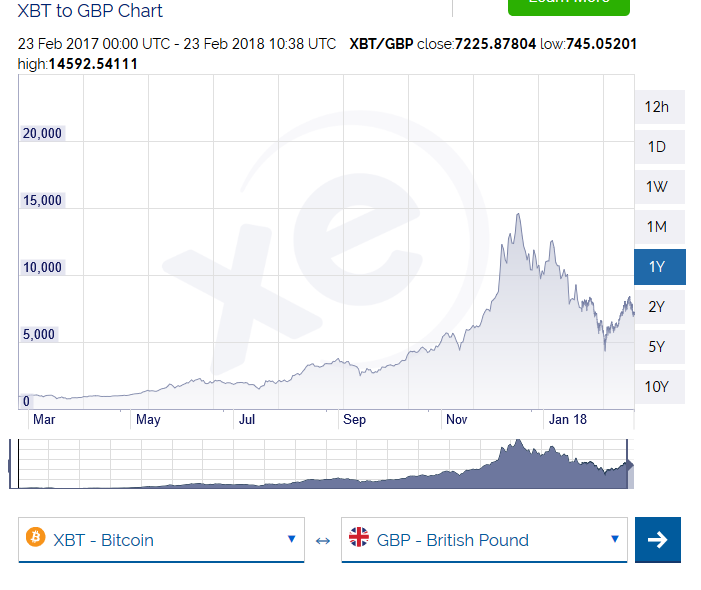insert_linkFirst: Why Should You Care About Bitcoin?
insert_linkYou need it more than you think
Even if you will not use it, knowing all about and how to use Bitcoin and other cryptocurrencies is a lovely intellectual item to have in your toolbelt. One of the fun parts about becoming proficient with computers is expanding your knowledge; broadening your awareness.
Of course, you wouldn't learn about something for the sake of knowing about it—it is only valuable learning about something that is relevant to you. Well, guess what? Cryptocurrency is especially relevant currently, considering its recent increased popularity.
Perhaps you could take advantage of cryptocurrencies to make some juicy profit, as well as anonymous payments. Are you a software developer wanting to specialise in the blockchain? All computer enthusiasts can easily benefit from knowing about—and understanding—cryptocurrency today.
Have a sneak peek at some of the reasons why you must read this article on how to use Bitcoin:
insert_linkAdvantages of using cryptocurrency:
- It's decentralised.
- It's international.
- Make anonymous transactions.
- The transactions are secure.
- Only you initiate outbound payments.
- You own your wallet (though not so much with web services).
insert_linkSome Things We Will Cover:

- What is Bitcoin?
- Is Bitcoin legal?
- How to use Bitcoin.
- Get a Bitcoin wallet.
- Buy Bitcoins with cash and exchange your Bitcoins.
- How to get Bitcoins for "free" (through cryptocurrency mining).
- Where to spend Bitcoin.
- Bitcoin scams.
- Bitcoin price.
insert_linkBut What is Bitcoin and Cryptocurrency Exactly?
First of all, we must understand Bitcoin before learning how to use it. You can refer to the Wikipedia articles on cryptocurrency if you ever need more details. For now, prime yourself for information overload...
Essentially, cryptocurrency is its own form of digital currency. It is decentralised, meaning it is not controlled or regulated by a bank or government.
Addresses, a public key of letters and numbers, are used to represent someone's cryptocurrency wallet. These wallets identify how much coins you possess, similar to a traditional bank account. There are multiple forms of wallets, including offline ones and web-based wallets that are offered by online services.
Unlike bank accounts or services like PayPal, there is nobody who can revoke your wallet—only you know the private key and wallet address in order to access your wallet.
insert_linkTransactions
Transactions of cryptocurrency involve sending coins from one address to another. Aside from the decentralised nature of cryptocurrency, a factor explaining its widespread adoption is its anonymity; no personal details (including names) are recorded, so you can't be personally identified. Additionally, transactions are not refundable.
Being decentralised, cryptocurrency uses a blockchain, which is a public database of all transactions as a ledger. There are computers on a cryptocurrency network that retain a copy of the ledger, so when a transaction is made, the details of it are put on to the end of the ledger and sent to these computers when the blockchain it is updated.
Each device on a cryptocurrency network validates your cryptocurrency 'coins' when making transactions: all transactions are encrypted and have to be verified by multiple points on the networks. Because of this, the network is secure, preventing fraud.
Finally, only you can initiate payments from your wallet; there is no way for companies to take money out of your wallet like they can with your bank account. This ensures that you have complete control over what you spend your money on and, provided you do not disclose your private key, nobody can take money from you.
When dealing with cryptocurrency, you will hear the term 'fiat money.' If you do not already know, this basically means money that has its value established by and regulated by a government, such as the British Pound. If it wasn't for the UK government, a £10 note would not be any more than a slip of paper with some pictures on it.
insert_linkExamples of Cryptocurrencies
The original cryptocurrency is Bitcoin, made in 2009. Since then, many people have created their own coins called altcoins (alternative coins.) Bitcoin is currently the most popular coin, with the most acceptance from some online shops and services, and even some shops in the real world.
Here are a few logos of the most popular and well-known cryptocurrencies:






insert_linkIs Bitcoin Legal?
Understandably, some people have the perception that cryptocurrency is a terrible thing, or even illegal. Although this is not true, some people do use cryptocurrency maliciously. But then again, criminals also use fiat currencies as a medium for exchange.

Ever wanted to know how to use Bitcoin maliciously? (Don't). You may have heard of some ransomware outbreaks from various news outlets that encrypt people's computers, demanding that they pay in Bitcoin to decrypt the files. Ransomware is a whole other topic, though why is it that cyber-criminals prefer cryptocurrency?
Well, you see, cybercriminals absolutely love the anonymity of cryptocurrencies, and that the payments aren't refundable. Consequently, they can't be traced, and the victims of the scam have no way of reclaiming their hard-earned cash. However, this does not mean cryptocurrencies are bad: this is simply criminals exploiting the advantages of the cryptocurrency.
insert_linkGet Started with How to Use Bitcoin
Eager to join in on all this fun? Good for you! Now we can really start to explore how to use Bitcoin and cryptocurrency in general. Firstly, you will need to get a wallet. I think the easiest way of doing this is to sign up for a web-based wallet.
But remember, since your wallet will be stored online, there exists a slim chance that the provider could be hacked. Therefore, find a reputable, trusted brand to manage your funds. The services I recommend here are ones I have used and trust myself.
insert_linkHow to Get a Bitcoin Wallet
There are many places where you can get a web-based wallet. Alternatively, you might rather store your wallet on your computer, or even a specialised device if security is your thing.
If you want the convenience of a web-based wallet, I recommend Coinbase. This reliable service allows you to have wallets for Bitcoin, Bitcoin Cash, Litecoin and Ethereum, as well as fiat currency wallets.
Other options for Bitcoin wallets can be viewed here.
This Trezor hardware wallet seems like a good option if you're after security. It allows you to store Bitcoins, Dash, Litecoin, Zcash and Ethereum.
For other cryptocurrencies, do a quick search and find the best option for storing your coins.
Once you acquire your wallet, unless the web-service handles this for you, keep a note of your wallet's address and password (or whatever is used to access the wallet.) Never disclose the private key or password of your wallet to anyone.
insert_linkMake and Receive Payments
When making a payment through Bitcoin, you will need to send a certain amount to somebody else's address. In spite of the fact that this experience will vary between wallet providers, the process is the same.
Most importantly, you will need to know the address of the person you are sending coins to (copy & paste is your friend.) Just as importantly, you will need to know how much to send. To be able to do this, you might be required to use an online conversion tool like this one.
Unlike with credit/debit card transactions, you will not need to provide any sensitive information when paying a service provider. On the contrary, you will only have to supply your address, so the company can see when you make the payment.
For receiving payments, all you need to do is provide your wallet address to the person from whom you are receiving the payment. Subsequently, it is the responsibility of the payer to send you some juicy coin.
insert_linkBuy and Sell Your Coins
A wallet is useless if you can't get any coin on it in the first place. How do you buy Bitcoins with cash? Fortunately, you can use services called exchanges which allow you to trade between different cryptocurrencies as well as buy/sell cryptocurrency with fiat money.
Again, Coinbase is a great option here: it enables you to trade between its four supported cryptocurrencies for free. Moreover, you can buy and sell cryptocurrency with fiat money if you are in one of the supported countries.
By the way, if you use my Coinbase link, you will get £7 ($10) worth of Bitcoin when you buy or sell £72 ($100)—a great deal as far as I'm concerned.
You only need to sign up for an account, verify yourself with ID, then afterwards buy and sell as much as you want.
Next up, if that doesn't particularly tickle your armpit, LocalBitcoins is another superb service I am satisfied with. You can buy and sell Bitcoins from sellers and buyers, or even become one of those sellers and buyers if your money is plentiful.
Take into account that, while this service does its best to try and protect your payments, some payment options are better for others to ensure an honest payment. That is to say, be mindful of potential scams. Visit this link to find out more.
Once again, search the Internet for some dependable exchanges, if you use a different cryptocurrency.
insert_linkCryptocurrency Mining
insert_linkHow to Get Bitcoins for Free
See the article on mining if this is something you want to explore in more depth. This is what you need to know:
Computers on a cryptocurrency network donate their processing power to generate hashes that attempt to verify transactions—referred to as cryptocurrency 'mining.' Especially relevant, why should you care? Simple: the motivation for people to mine on a network is the reward.
Mining is similar to a lottery. Every so often, a reward (in the form of cryptocurrency coins—a lot of them) is given out to the device that successfully generates the correct hash that verifies the block of transactions. On top of that, a 'hash rate' is the measure of the number of hashes a machine can generate using a certain algorithm per second.
And as you would expect, the more powerful a machine, the higher its hash rate is. Different cryptocurrencies can use different algorithms to generate hashes, hence the hash rate can vary between mining each of them.
insert_linkHow to Mine Cryptocurrency
So, what can you use to mine some coin? There are devices dedicated to mining like these Bitmain models. Another option would be to mine with a GPU or your CPU. Note that GPUs produce higher hash rates and can mine much more algorithms.
Unfortunately, the chances of you stumbling upon the reward alone is extremely unlikely, especially if your machine is not particularly powerful. For this reason, many people decide to use mining 'pools': a network of miners that you could mine for.
If any device on a pool generates the 'magic hash,' the reward goes to the network. From this, the network distributes the earnings in proportion to the amount of processing power each device is contributing. Have a search with DuckDuckGo to find some pools for your cryptocurrency.
From the Future: Mining Profitability 2018—Is it Easily Worth Your Time?
insert_linkThe Best Method for You
Alternatively, you could use a service like NiceHash to sell your processing power for someone to buy and mine a certain currency with. Going down this route, you will be paid in Bitcoin. On the other side of things, you could also buy hashing power to mine from NiceHash if you don't have the hardware.
If you do want to start mining with your computer, note that your performance will be significantly affected. Hence, I shall recommend mining when not doing heavy resource-consuming tasks, such as gaming or doing 3D modelling. Equally, you could mine when not even using your computer, given it is sufficiently profitable.
For more information on how you can mine using your computer, even without a GPU, tune in for the follow-up post I will shortly be releasing. Then I will show you exactly how you can get into mining (because you should) without having to invest in a super-expensive mining farm. (Although feel free to go full-out on buying mining hardware!)
Also watch this video, which is a comprehensive guide specifically talking about Bitcoin.
insert_linkNo Malware Here

These mining services are completely legit and malware-free. Despite this, your antivirus will inevitably complain about your downloaded mining software. Do not worry, this is simply because some malware comes in the form of miners that use your system resources to mine. Of course, don't let someone else profit from your machine at the expense of your performance!
Furthermore, you can safely allow onto your system software you have download from NiceHash. I have done so myself, and I am perfectly fine.
insert_linkWhere to Spend Bitcoin
Bitcoin is great for using services with complete anonymity, yet not all websites have fully adopted it. Fear not—there is a plethora of splendid services to use your Bitcoins on. Besides, that list keeps on growing with increased popularity.
Some services I recommend that you could use your Bitcoin with include:
- Buy hashing power with NiceHash to accumulate more Bitcoins.
- Sign up for a worthy VPN service like NordVPN to stay super-anonymous.
- Buy gift cards for popular retailers such as Amazon where Bitcoin is not directly accepted.
- Buy apps and games from Microsoft.
- Donate to charities and non-profit organisations like Mozilla.
On a final note, just make sure to stay away from the dodgy stuff; and don't engage in any illegal activity.
insert_linkThings You Mustn't Ignore
Alas, just like when managing your bank account, there are potential risks. Some are similar to the risks you encounter outside of cryptocurrency, and some are more exclusive to the matter. I will elaborate more on the topic of mining in the follow-up post to this one, so make sure to subscribe to the latest posts!
insert_linkBitcoin Scams
Look out for scams. Make sure that if you sign up for a wallet, mining, or trading service, or download any sort of software, that the website is trusted, reputable and not too good to be true. Unfortunately, due to the nature of cryptocurrency, scams are something to be vigilant about.
Most of all, if you are uncertain about a website, check badbitcoin.org for a list of illegitimate websites as well as other tips to keep safe from the bad man.
insert_linkThe Fluctuating Prices
Like fiat currencies, the price of your cryptocurrency is constantly changing—only more drastically. The same amount of Bitcoin could be worth £200 one week and £300 the next, albeit that is a more extreme example.
To see how the price of Bitcoin has fluctuated in the past year alone (2017–2018), see this chart.

You need to know when to buy and sell your cryptocurrency to avoid losing money, and maybe even make some. So, always be checking the value of your cryptocurrency against your fiat currency, or other cryptocurrencies you wish to trade with. Coinbase has a nice chart built into the dashboard for comparing currencies.
The best strategy is to sell when the price is high and buy when it is low—no surprises. If the price of a cryptocurrency starts descending, you have to decide whether to hold on to it until the price recovers or sell it immediately. While it is possible to profit from the changing price, I would avoid doing any speculation since it is risky to invest in Bitcoin this way.
Also, don't worry. You will probably regret some transactions; it is inescapable. I regret many things. Sad, sad memories. Traumatic memories.
We don't like to discuss the incident. You can go now.
…but not without subscribing to the latest posts here.


